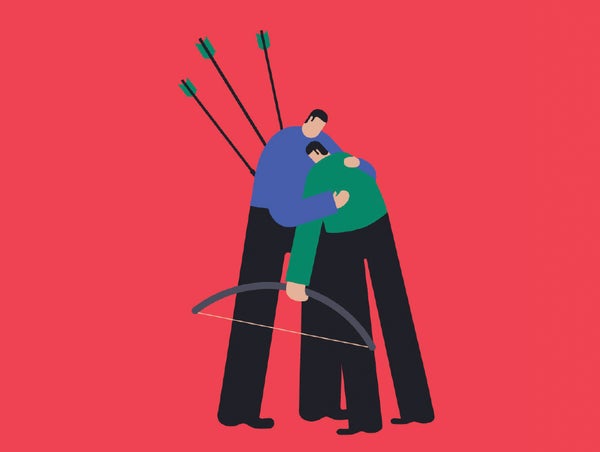When I first decided to write about forgiveness for this end-of-year column, I was thinking about the holidays and how a little extra forgiveness among friends and family could make this season merrier. But as I delved into the rich well of research, it dawned on me how much our larger human family needs forgiveness right now. The past 12 months have seen more than their fair share of tragedy and injustice: violence between citizens and police, terror attacks, divisive elections. So much injury has been done, and so many people have been left in grief—can the anger and trauma ever be resolved? The forgiveness researchers I talked to say that it can and that it starts with you and me learning to forgive, in both big ways and small.
#1 Forgive for your own sake. We often talk about forgiveness as if it's a gift to bestow on someone once they have apologized or made restitution. I suppose that paradigm works fine for everyday injuries like dinging a car door. But how could anyone ever make restitution for killing a person's family member or terrorizing a nation? They can't. That's why it is important to grasp that “forgiveness is for you and not for anyone else,” says psychologist Frederic Luskin, director of the Stanford Forgiveness Project, a series of workshops and studies for people affected by everything from office politics to deadly international conflicts.
Forgiveness—deliberately letting go of negative feelings toward someone who has harmed you—appears to have significant health and wellness benefits for the person giving it. In an early seminal study, Luskin and his colleagues led a workshop for five women from Northern Ireland who had lost children to sectarian violence. After one week, not only did the women feel dramatically less hurt, their depression scores fell by 60 percent. Six months later the women reported feeling half as stressed as they had before the workshop. Many other studies since have come to similar conclusions: a 2014 meta-analysis of 54 studies linked increased feelings of forgiveness with significant reductions in depression and anxiety.
On supporting science journalism
If you're enjoying this article, consider supporting our award-winning journalism by subscribing. By purchasing a subscription you are helping to ensure the future of impactful stories about the discoveries and ideas shaping our world today.
#2 Aim for empathy. There are several evidence-based counseling techniques meant to help people move toward forgiveness, says psychologist Everett Worthington, co-author of the 2014 meta-analysis and a longtime researcher at Virginia Commonwealth University. In his process, known by the acronym REACH, the first step is to recall the hurt that was done to you as objectively as you can. “We try to get people to look at things from the point of view of the person who hurt them and get a sense of empathy for what was going on with that person,” Worthington says.
One exercise he uses to build such empathy is the empty chair dialogue, a decades-old therapeutic tool. In his version, you sit across from an empty chair and pour your heart out as if the person who harmed you is sitting right there; then, you switch seats and talk from that person's point of view about why “you” did what you did. If you can foster empathy—or even pity—for the person who hurt you, those less negative emotions will begin to edge out some of the pain and anger you feel, Worthington says.
#3 Calm the fight-or-flight reaction. Feelings of hurt and trauma often come in waves—and as the feelings crest, your body switches into fight-or-flight mode, Luskin says. In these moments, he recommends intervening with a simple stress-management technique such as deep breathing or a compassion meditation. This tends to work best in situations where you have had adequate time to grieve. If stress management doesn't make a dent in your suffering, he says, it's a sign that “the issue is something that really needs attention and may not be easy to tackle on your own.”
#4 Keep trying. Forgiveness takes time. “You don't go right to forgiveness when something first happens,” Luskin says. “You have to take time to let the wounds heal and allow the mind to recover from the shock.” Once you are ready to try to forgive, the more time you spend endeavoring to do it, the closer you get to it, Worthington says. “The research is clear,” he says. “You get about one tenth of a standard deviation closer to forgiveness for every hour you spend working on it.” These findings come from professionally led workshops and therapy sessions, which are much different than trying to do it on your own, but Worthington says persistence pays off in self-help situations, too. Even just making the decision to try to forgive moves you a bit closer.
Although we may seek to forgive first and foremost for our own well-being, Worthington believes that it can have a cascading effect on the people around us and even society at large. “The more we can lower the amount of background bitterness, resentment and hostility, the fewer people are going to end up reaching their threshold and doing something that's terrible or violent.” It has been a hard year, and there is much to be forgiven. Yet is it crazy to think that it can start … with each of us?
